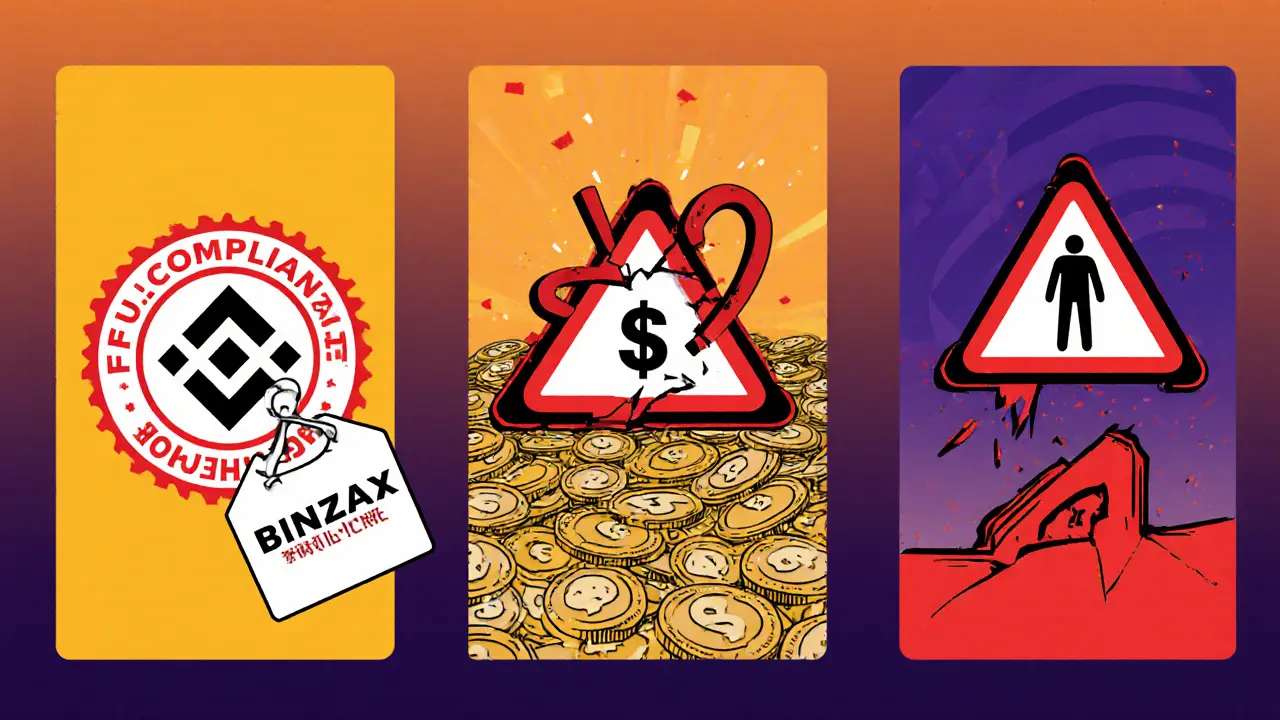Crypto Exchange Risk Checker
Check Your Crypto Exchange Safety
Use this tool to see if your preferred exchange meets India's compliance and security standards.
Based on the latest May 2025 data from the article: "Crypto Exchanges to Avoid in India – Risks & Red Flags"
Filter Your Results
Exchange Comparison Table
| Exchange | FIU Status | Banking Support | Security | Tax Reporting | Risk Level |
|---|
Important Note
Regulatory status can change quickly. Check the exchange's website and FIU-IND updates quarterly to verify current compliance status.
For the latest information on FIU-compliant exchanges, monitor the FIU-IND website or trusted crypto news sources.
When you trade crypto in India, the platform you pick can be the difference between a smooth profit and a nightmare. A handful of exchanges have run into serious compliance issues, security breaches, or both, leaving Indian users exposed to blocked deposits, frozen accounts, and even legal trouble. Below we break down the most dangerous exchanges for Indian traders, explain why they’re risky, and give you a quick checklist to stay safe.
What makes an exchange risky for Indian users?
Crypto exchange is a digital platform that allows users to buy, sell, and trade cryptocurrencies. In India, risk usually stems from three sources: non‑compliance with the Financial Intelligence Unit of India (FIU‑IND), weak security architecture, and inadequate consumer‑protection mechanisms.
FIU‑IND is the watchdog that enforces anti‑money‑laundering (AML) rules on crypto firms. If an exchange ignores FIU guidelines, Indian banks often refuse to process INR deposits, and the government can slap hefty penalties. Security failures, like hacks or compromised wallets, can wipe out user funds in an instant. Finally, without clear grievance procedures, users have little recourse when accounts are frozen or funds disappear.
Top red‑flag exchanges for Indians (May2025)
- Binance the world’s largest crypto exchange, known for low fees and a huge token list. In early2025 the FIU imposed a multi‑million‑dollar penalty for failing to integrate KYC/AML protocols required in India. The breach has led to blocked INR deposits for many Indian users and heightened scrutiny from Indian banks.
- Bybit a fast‑growing international exchange focused on derivatives. Bybit received a similar FIU fine in March2025 for not reporting suspicious transactions, and several Indian payment gateways stopped supporting its INR deposits.
- WazirX India’s biggest home‑grown exchange, with over 6million users and $5.4billion monthly turnover. In July2024 a hack on a multi‑signature wallet stole $230million. The platform still holds user funds in a single pool, and its promised reimbursements have not materialised, raising serious trust concerns.
All three platforms share the same red flags: FIU non‑compliance, banking relationships in jeopardy, and weak post‑incident user protection.
Why non‑FIU compliant exchanges hurt you
When an exchange isn’t on the FIU’s compliance radar, Indian banks treat it as a high‑risk entity. The most common fallout includes:
- Blocked INR deposits - users see “failed transfer” messages while trying to fund their accounts.
- Frozen accounts - if a bank flags suspicious activity, the exchange may lock the user out without warning.
- No legal recourse - Indian authorities typically won’t intervene in disputes with non‑registered platforms.
Adding to the headache, non‑compliant exchanges rarely supply tax‑reporting statements that line up with India’s 30% capital‑gains tax and the 1% TDS on crypto sales above ₹50,000 per FY. That means you have to manually calculate every gain, a time‑consuming and error‑prone process.

Security lapses you can’t ignore
Security is a make‑or‑break factor. The WazirX breach showed how a single compromised wallet can erase hundreds of millions in user funds. Look for these warning signs before you deposit:
- Absence of multi‑factor authentication (MFA) for withdrawals.
- Limited information about cold‑storage practices.
- No public security audit reports or bug‑bounty programs.
If an exchange can’t prove it’s safeguarding assets, treat it as a “crypto lottery” - you might win, but the odds are stacked against you.
Safer Indian‑friendly alternatives
Not all platforms are risky. The following exchanges generally keep a cleaner compliance record and have stronger ties to Indian banks:
- CoinDCX - actively works with FIU, offers a built‑in tax calculator.
- CoinSwitch - aggregates liquidity from multiple partners, making INR deposits smoother.
- ZebPay - one of the oldest Indian exchanges, known for solid KYC procedures.
- Unocoin - focuses on simple buying/selling, partnered with several Indian banks.
- Bitbns - provides extensive crypto pairs and claims compliance with RBI guidelines.
Even these platforms can face regulatory shifts, so keep monitoring their compliance status.
Quick checklist before you trust an exchange
- Is the exchange listed as FIU‑compliant? Check the FIU‑IND website or official press releases.
- Does it have a partnership with at least one Indian bank or a recognized payment gateway?
- Are security features like MFA, withdrawal whitelist, and cold‑storage disclosed?
- Does it provide downloadable tax reports that match Indian tax law?
- Is there a clear grievance redressal policy with specified timelines?
Failing any of these items should raise a red flag.

Risk comparison table
| Exchange | FIU status | Banking support (INR) | Recent security incidents | Tax reporting tools |
|---|---|---|---|---|
| Binance | Non‑compliant (penalty $5M) | Intermittent, many banks block deposits | No major hack, but AML violations | Manual export only |
| Bybit | Non‑compliant (penalty $2.3M) | Limited, some gateways refuse INR | Minor phishing breach 2023 | None |
| WazirX | Partially compliant (under review) | Generally OK, but recent freeze reports | July2024 hack - $230M loss | Basic CSV export |
| CoinDCX | FIU‑compliant | Full INR deposit/withdrawal support | No major incidents since 2022 | Integrated tax calculator |
| ZebPay | FIU‑compliant | Stable banking links | None reported 2023‑2025 | Tax statements available |
These data points illustrate why the first three exchanges should be approached with caution, while the latter two score better on compliance and security.
Potential legal fallout
Choosing a non‑compliant exchange can attract the attention of India’s Enforcement Directorate (ED). Even if you’re not intentionally laundering money, the ED may open investigations if they see large, unexplained crypto flows on platforms that lack AML reporting. Penalties can include asset freezes, travel bans, and hefty fines. In extreme cases, users have been summoned for questioning simply because their exchange was on a watch‑list.
Staying on a compliant platform dramatically reduces the chance of being dragged into such legal mazes.
How to keep your crypto safe in a shifting regulatory climate
Regulation in India is still evolving. Here’s a practical routine you can adopt:
- Every quarter, Google the exchange name + “FIU compliance” to catch any new penalties.
- Enable all available security settings - especially hardware‑wallet withdrawals for large balances.
- Maintain a separate cold‑storage wallet for any crypto you don’t actively trade.
- Export monthly transaction statements and store them in a secure cloud folder for tax filing.
- Subscribe to a reputable Indian crypto news outlet to stay aware of regulatory announcements.
By treating your exchange choice as a living decision rather than a set‑and‑forget step, you’ll stay ahead of both regulators and hackers.
Frequently Asked Questions
Is Binance illegal for Indian users?
Binance is not illegal, but it is currently non‑FIU compliant. This means Indian banks may block INR deposits and there is a higher risk of regulatory action. Users can still trade, but they should be prepared for possible fund freezes.
What should I do if my WazirX account is frozen?
First, reach out to WazirX support with your KYC documents. If you receive no response within 14 days, file a complaint with the FIU‑IND and consider moving remaining funds to a compliant exchange. Keeping evidence of all communications is crucial for any future legal claim.
Can I claim tax deductions for crypto losses on a non‑compliant exchange?
Yes, Indian tax law allows you to deduct net crypto losses against gains, but you must provide transaction records. Because non‑compliant platforms rarely give ready‑made reports, you’ll need to manually compile buy‑sell data from your wallet or trade history.
Which Indian exchange offers the best tax reporting feature?
CoinDCX provides an integrated tax calculator that aligns with the 30% capital‑gains rate and auto‑generates TDS statements, making year‑end filing much simpler.
How often does FIU publish a list of compliant exchanges?
As of May2025, FIU‑IND has not released a definitive public list. They issue press releases for major penalties, so monitor news outlets and the FIU website for updates.


Hey folks, just wanted to remind everyone that the FIU‑compliance status is the first thing to check.
If an exchange isn’t on the approved list, banks will likely block your INR deposits.
Look for clear KYC procedures and a transparent security policy.
It saves a lot of headaches later.
Wow, reading this feels like watching a thriller where the villains are hidden behind slick interfaces!
Binance and Bybit might look tempting, but their non‑compliance screams red flag louder than a siren.
Security breaches? That’s a disaster waiting to happen.
Stick with platforms that actually care about Indian regulators!
Yo crypto community! If you’re hunting for safe playgrounds, keep your eyes on the FIU‑compliant crew.
CoinDCX and ZebPay are like the friendly neighborhood gyms – always open, always watching your back.
Don’t let the hype of big names drown out the solid fundamentals.
Your money deserves a steady, reliable home!
Friends, I feel the panic when I see those headlines about blocked deposits, but remember we have choices!
The chart makes it clear: some exchanges are swimming in trouble, while others stand on solid ground.
Let’s rally around the compliant ones and share our experiences.
Together we can navigate this maze without losing peace of mind.
This whole scene is a massive scam.
Alright, let me break down why you should read the fine print before dumping money into any exchange.
First, the FIU‑compliance badge isn’t just a sticker; it’s a legal shield that keeps your INR deposits flowing.
Second, a non‑compliant platform can have its banks pull the rug out from under you overnight.
Third, security incidents like the WazirX hack show that even big names can crumble when cold‑storage practices are weak.
Fourth, tax reporting tools matter because the Indian tax code is unforgiving if you can’t prove your gains.
Fifth, always check if the exchange offers multi‑factor authentication for withdrawals.
Sixth, keep an eye on whether they publicly share audit reports or bug‑bounty programs.
Seventh, the community feedback on Reddit and local forums often reveals hidden problems before regulators catch up.
Eighth, make sure the exchange supports a reputable Indian bank or payment gateway.
Ninth, remember that penalties like the $5 million hit on Binance aren’t just fines; they signal deeper compliance gaps.
Tenth, having a built‑in tax calculator, like CoinDCX provides, can save you hours of manual spreadsheet work.
Eleventh, never store all your crypto on a single exchange; diversify between hot wallets and cold storage.
Twelfth, if an exchange suddenly blocks your deposits, don’t panic-withdraw to a hardware wallet ASAP.
Thirteenth, set up withdrawal whitelists so only your trusted addresses can receive funds.
Fourteenth, stay updated quarterly by googling the exchange name plus “FIU compliance” to catch any new penalties.
Fifteenth, in the end, a disciplined approach beats chasing flashy promos every time.
Good points, especially about the tax calculator.
I’d add that exporting CSVs every month keeps the audit trail clean.
It is incumbent upon every investor to uphold the highest ethical standards, lest we contribute to a chaotic market.
Liquidity pools, tokenomics, and KYC compliance are the trifecta that separates legit ops from rogue platforms.
Without those pillars, any exchange is just a house of cards.
Honestly the list is a lifesaver.
I’ve switched to CoinDCX after the WazirX fiasco and never looked back.
The UI could use some polish but it works.
I must stress that cultural awareness alone won’t protect you; regulatory compliance is non‑negotiable.
🚀 Stay safe and keep those coins humming! 😊
Thanks for the thorough rundown :) I’ll double‑check my exchange tonight.
Avoid the non‑FIU ones.
Listen up, if you’re still using Binance you’re playing with fire, switch now!
Looks like another fluff article nothing new
Let’s all share our experiences calmly and help each other find the best platforms.
They probably hide offshore accounts and manipulate data to keep us in the dark.
While the article highlights valid concerns, it could also mention that some exchanges are actively working to improve compliance, which merits acknowledgment.
The crypto world is a wild ride but we can tame it if we keep our eyes open and our wallets secure.